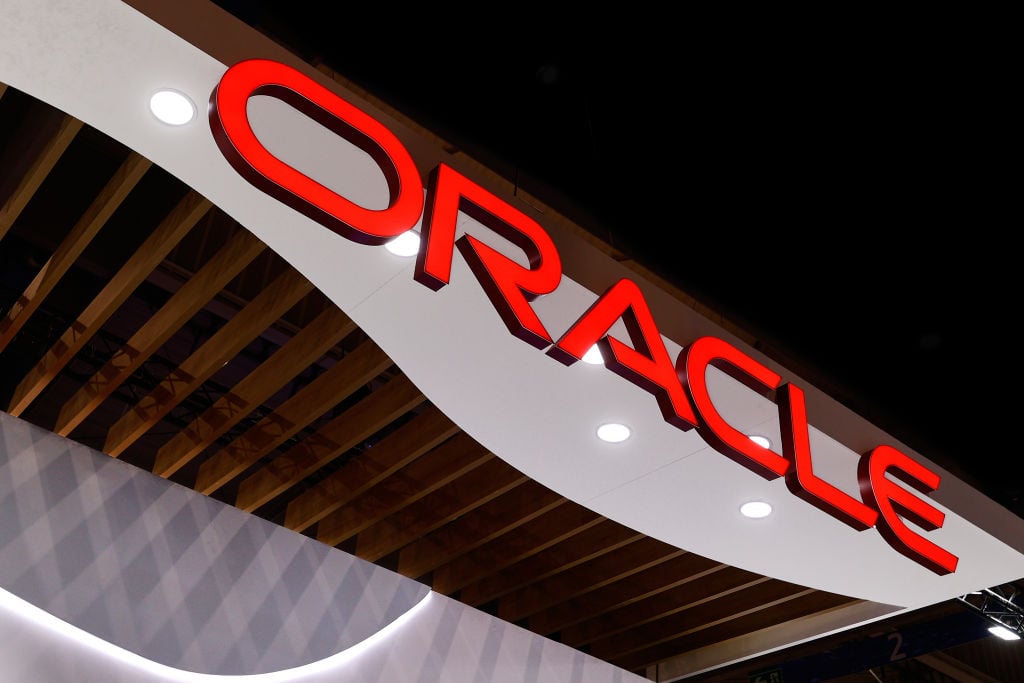For years, database giant Oracle (ORCL 3.37%) struggled to make a dent in the cloud computing market. Amazon Web Services, Microsoft Azure, and even Alphabet's Google Cloud ran circles around the company.
Artificial intelligence (AI) is now changing everything. Demand for AI infrastructure is exploding, with tech giants and start-ups scrambling to secure capacity to both train and run advanced AI models. Oracle is emerging as an enormous winner.
Oracle's cloud infrastructure revenue grew by 55% year over year in the first quarter of fiscal 2026 to $3.3 billion, and the company expects the unit to produce $18 billion of revenue for the full fiscal year. Beyond fiscal 2026, things start to get crazy. Because Oracle has signed so many multibillion-dollar contracts with leading AI companies, cloud revenue is set to absolutely explode.

Image source: Getty Images.
An incredible backlog
Oracle reported that its remaining performance obligations, a metric that measures future revenue that the company expects to generate from existing contracts, more than quadrupled year over year in the first quarter to $455 billion. This was the result of the company signing multiple mega-deals for cloud infrastructure during the quarter.
The size of these deals is staggering. In June, Oracle disclosed that it signed a cloud deal that will generate $30 billion in annual revenue starting in fiscal 2028. While Oracle didn't disclose the customer, it was widely reported to be OpenAI. During the first-quarter earnings call, Oracle CEO Safra Catz noted that the company had signed additional cloud deals with xAI, Meta Platforms, Nvidia, AMD, and others in the AI industry.
This massive backlog of cloud deals is set to cause Oracle's cloud revenue to explode, assuming the company can build new data centers quickly enough to meet demand. The company expects cloud infrastructure revenue to grow to $32 billion in fiscal 2027, $73 billion in fiscal 2028, $114 billion in fiscal 2029, and $144 billion in fiscal 2030. Most of this revenue is already booked through existing contracts. For comparison, Oracle's total revenue in fiscal 2025 was just $57.4 billion.
While Oracle is serving customers that need to train AI models, AI inference is expected to be a much larger market in the long run. Chairman Larry Ellison said during the earnings call:
In fact, the AI inferencing market will be much, much larger than the AI training market. AI inferencing will be used to run robotic factories, robotic cars, robotic greenhouses, biomolecular simulations for drug design, interpreting medical diagnostic images and laboratory results, automating laboratories, placing bets in financial markets, automating legal processes, automating financial processes, automating sales processes.

NYSE: ORCL
Key Data Points
Some questions remain
Oracle's forecast is impressive, but there are still some things investors need to consider before jumping into Oracle stock.
First, achieving the incredible revenue growth outlined in the company's outlook will require a massive increase in capital spending. Oracle spent $8.5 billion on capex in the first quarter, up more than 200% year over year. This pushed Oracle's free cash flow into negative territory. In fact, over the trailing-12-month period, Oracle's free cash flow stands at a loss of $5.9 billion.
As the company ramps up capital spending to fulfill its cloud contracts, free cash flow could sink further into negative territory until cloud infrastructure revenue accelerates. Oracle has around $11 billion in cash and marketable securities on hand, and it already has a large debt load of more than $90 billion. It's not clear how the company plans to finance its massive expansion in capital spending, but more debt could be on the table.
Then there's the issue of whether the AI industry is in a bubble. Some of Oracle's cloud deals are with AI companies burning through incredible amounts of cash, and it's unclear what the landscape will even look like four years from now. OpenAI's latest GPT-5 model was a dud relative to expectations, and there's a decent chance that frontier AI models are starting to hit a ceiling in capabilities.
One thing to remember: While OpenAI has reportedly signed a deal to eventually pay Oracle $30 billion annually, its ability to pay depends on its own optimistic forecasts bearing out. OpenAI's annualized revenue today is reportedly around $12 billion, and it's burning cash at a staggering rate . If things go wrong for the company, or if raising capital becomes more challenging, that $30 billion cloud deal could go up in smoke.
One possible outcome is a massive overbuilding of AI infrastructure, which would be bad news for any company that owns a large amount of AI infrastructure. Other tech giants are taking a more cautious approach than Oracle. Microsoft CEO Satya Nadella warned earlier this year "there will be an overbuild" of AI infrastructure, and that he's happy to be leasing a lot of capacity for 2027 and 2028 rather than building it. "The only thing that's going to happen with all the compute build is the prices are going to come down," Nadella said in an interview.
Oracle's forecast is driving the stock to new highs, but investors should be aware of the risks before piling into the stock.





